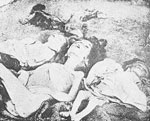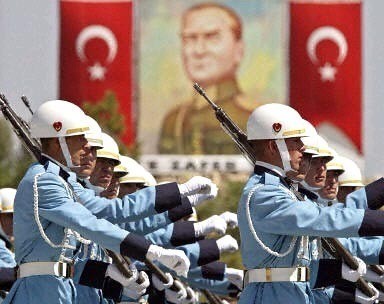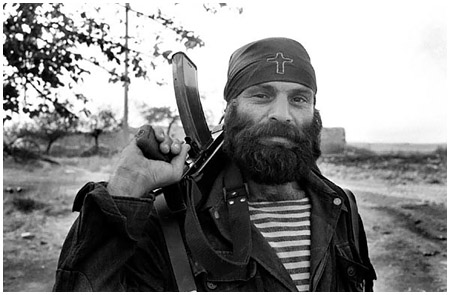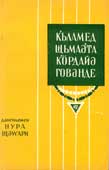Sunday, December 30, 2007
Tuesday, December 25, 2007
Kurdistan PM: Merry Christmas, the christians of Kurdistan!

The KRG (Kurdistan Regional Government in Southern Kurdistan , N. Iraq) congratulated the christians of Kurdistan on the birthday of christ: Christmas.
The prime minister Necirvan Barzani (grandson of the Kurdish national hero Mustafa Barzani) also wished a happy new year and was "wishing for gaining more achivments for the Kurdish people in the new year!)
Massoud Barzani, the president of Kurdistan (son to Mustafa Barzani and uncle to ) said on the 8th december:
 Pope Benedict XVI met the President of the Kurdistan Region, Masoud Barzani, who was
Pope Benedict XVI met the President of the Kurdistan Region, Masoud Barzani, who wasaccompanied by his government's Prime Minister, Nechirvan Barzani. 2005.
"We welcome any Christian brothers who choose to come and live in Kurdistan, whether temporarily or more permanently. This is their country and we will not prevent any of them from taking refuge.
You are the owners of this land, you are the protectors of its ancient history, therefore no one can prevent you from living here," the leader of the Kurdistan Democratic Party said, inviting Christians to "send letters to your relatives and your brothers in Baghdad, Basra or any other Iraqi city, or even abroad, to come and reside in Kurdistan, whether definitively or until the security conditions in the country improve.
I can assure you that we will not allow anyone to oppress you, you are free to accept this fraternal co-inhabitance and to help in the building of your country."
There are several Armenian, Assyrian and Chaldean villages in south Kurdistan such as Ainkawa (Hewler), Duhok and in the rest of the Bahdinan region.
Yerevan worried about the Turkish invasion of south Kurdistan

In the capital of Armenia, Yerevan, Foreign minister Vartan Oskanian
is worried about the methods that Turkey is using to invade south
Kurdistan (northern Iraq). He thinks that they can use the same
methods against Armenia, Turkey wants to help Azerbaijan to solve
the Karabakh conflict and that is why the Turkish methods is dangerous.
Vartan said during he Armenian-Turkish Relations: Problems and
Prospects extended parliamentary hearings:"Turkey crossed the border of a sovereign state without UN sanction.
This move can't but arouse concern. Armenia, as Turkey's
neighbor, can't feel safe"
Sunday, December 23, 2007
The Kurdish Armenian congress 1909

The Armenian and Kurdish peasantry were more secure and prosperous than they had been in living memory in 1908 in northern Kurdistan (occupied by the Ottoman Empire before the republic of Turkey was created).
Sheik Abdul Qadir created in the spring of 1909 in Shamdinan the Kurdish Armenian congress in purpose to unite the Kurdish and Armenian people and to create a brotherhood between them.
Sheik Abdul said
"We must live like brothers with the Armenians. We must restore those lands wich they claim and wich have not yet been restored. We will work to strengthen understanding and concord among Ottoman compatriots"
A year after this, in the autumn of 1910, Sayyid Nursi himself traveled through Amêd (Diyarbakir in turkish occupied Kurdistan) and urged the Kurds to unite and not see each others diffrences. He also said:
"Kurdistan belonged to the Kurds and Armenians, not the Turks"

Wednesday, December 19, 2007
Robinson Crusoe in Kurdish from Armenia (1936)
Tuesday, December 11, 2007
San Diego Statement
Today, Turkish special commandos actually collect rewards for the severed heads of Kurdish guerillas and others, casually referring to their victims as Armenians, leaving no doubt as to what is in store for the Kurds and their national aspirations
Statement by Congressman Bob Filner (D of San Diego in 1997 at the United States congress 1th May 1997.
Friday, December 7, 2007
Sunday, December 2, 2007
Tuesday, November 20, 2007
Desmond visits Sweden
“The Linguistic Genocide of Kurds in Turkey and the Problem of Educational Rights"
(8 Dec - 17.00 - Kurdish Library in Stockholm)
Desmond was a Senior Lecturer in Human Geography (1994-2006) and The Geography of Genocide (2001-2006) at De Montfort University, Bedford, England, and has published widely in a number of journals, including The Thailand Environment Institute Quarterly, Socialist Lawyer, L'Appel du Kurdistan, Armenian Forum, Kurdistan Aktuell, and Law, Social Justice and Global Development.'
- The Kurdish and Armenian Genocides: From Censorship and Denial to Recognition?
- Colonial Genocides in Turkey, Kenya and Goa
Sunday, November 11, 2007
Kurdmania mentions the Armenian Genocide

This page is in German but visit this link and Google will translate the page to English.
Friday, November 9, 2007
Sunday, November 4, 2007
Antranik Pasa - Above the crowd (rare)
Wednesday, October 31, 2007
Ciwan Haco - Yerivan ( Yerevan )
Famous Kurdish singer Ciwan Haco from western Kurdistan, Qamishlo (Syria) sing about the capital of Armenia in Kurmancî.
Ciwan Haco is famous for his rock n roll and progressive music.
Tuesday, October 23, 2007
Holocaust denier Ahmadinejad in Armenia
 President of Armenia - Robert Kocharyan
President of Armenia - Robert KocharyanIranian president Ahmadinejad is currently visiting Armenia for private meetings with the Armenian president Kocharyan, Ahmadinejad will hold a speech in the Armenian parliament.
Mahmoud Ahmadinejad will also visit the Armenian Genocide memorial and the institute museum of the Armenian Genocide in the capital of Armenia and will leave Armenia tomorrow.

Today, Ahmadinejad made a symbolic speech in wich he avoided the word "genocide" in the Yerevan State University.
“Iran’s stand on the events of early 20th century in the Ottoman Empire bases on two principles, the first principle is that each nation should remember its history but face the future and this must not lead to repetition of the past. Second, Iran will always be by Armenia’s side” he said.
- Why should Germany not remember its history?
- Why was this "infringements of human rights" not a genocide?
Ahmadinejad is a holocaust denier and claims that no Jew have been killed during WW2 by Nazi-Germany.

Sunday, October 21, 2007
Turkey - fighting many battles
Other international genocide recognition has been made from countries like France, Argentina, Vatican city but also from Kurdistan.
Turkey immediately recalled the Turkish ambassador from U.S. because of the Armenian genocide bill. Since the genocide bill, the Turkish-US relation has since then been bad.
The Turkish president Abdullah Gül warned Bush that the genocide bill would hurt the ties between the countries, now Bush warns Gül not to enter southern Kurdistan (Iraq).
This genocide bill comes inappropriate for Turkey just as they had plans of (for the first time officially) invade southern Kurdistan. The excuse for invading S.Kurdistan is to fight the PKK guerrilla, but its obvious that Turkey has a hidden agenda.
It is S.Kurdistan they want to crush so that the northern Kurdistan (Turkey) Kurds wouldn't start fighting again for the Kurdish lands.
The Turkish PM Erdogan has once said:
"We wouldn't accept a Kurdish government, even if it was in Argentina".
Wednesday, October 10, 2007
Christians prays for Kurdistan and the Kurds
This material was found on http://centralasia.imb.org/
Exact Source

“Arise, shine, for your light has come, and the glory of the Lord rises upon you. See, darkness covers the earth and thick darkness is over the peoples, but the Lord rises upon you and his glory appears over you.”
Please take a moment to pray for the light of Christ's love to reach the Kurdish people.
Each photo is a prayer point.
For the past five centuries the Kurds of Central Asia have been forced to live under oppressive regimes and to seek refuge out of their traditional homeland. The oppression the Kurds have experienced has led many of them to believe that they are among the most hated peoples of the world. The Kurdish proverb, “Kurds have no friends,” expresses that sentiment. Despite the suffering the Kurds have endured, they remain a culturally distinct people. Please pray for the Kurdish people to find their worth and home in Jesus Christ. Pray also that God would provide redemptive friendships for the Kurds that they would come to know the Lord intimately.
 While there are an estimated 25 million Kurds throughout the world, over 5 million live in Iran. Primarily located in the northwest region, the Kurds are a marginalized group of shepherds, farmers and merchants. Kurdish children have limited access to education and many remain illiterate. Illiteracy among the Kurds creates an obstacle to sharing the gospel with them. In addition to literacy issues, the Kurds of Iran speak four different dialects of the Kurdish language, making it difficult to share the gospel of Jesus with them. Please pray that oral methods of sharing the gospel, such as audio Bibles, Christian radio broadcasts, and praise and worship music translated into the Kurdish dialects will reach the ears of Kurds in Iran.
While there are an estimated 25 million Kurds throughout the world, over 5 million live in Iran. Primarily located in the northwest region, the Kurds are a marginalized group of shepherds, farmers and merchants. Kurdish children have limited access to education and many remain illiterate. Illiteracy among the Kurds creates an obstacle to sharing the gospel with them. In addition to literacy issues, the Kurds of Iran speak four different dialects of the Kurdish language, making it difficult to share the gospel of Jesus with them. Please pray that oral methods of sharing the gospel, such as audio Bibles, Christian radio broadcasts, and praise and worship music translated into the Kurdish dialects will reach the ears of Kurds in Iran.
Life for a Kurdish woman is centered in the home. As a young bride she must move into her mother-in-law's home and take on every chore—drawing the family's water, milking the family goat, preparing each meal, cleaning the house and raising the children. She often endures verbal and physical abuse from her mother-in-law and other members of her husband's family. Please pray that the hope of Jesus Christ touches the hearts and lives of these women. Pray that they will have the opportunity to feast on the Bread of Life even as they care for their families.






There are a few Kurdish followers of Jesus. Most Kurds are like lost sheep without a shepherd. The Muslim Kurds of Iran are among those lost sheep. Please pray for Kurdish believers in Jesus to develop a vision to share the gospel with their fellow Kurds in Iran. Pray that the Kurdish believers would be relentless in their pursuit of these lost sheep. Pray that the Kurds of Iran would recognize Jesus as the only way to salvation.
“I am the gate; whoever enters through me will be saved. He will come in and go out, and find pasture ... I have come that they may have life, and have it to the full.”
—John 10:9-10
The Kurdish people need to experience the hope of the life-giving message of Jesus Christ. The Lord desires that all Kurds come to know Him. Pray that God would be glorified among the Kurds of Armenia, Turkey, Iran, Iraq and Syria. Pray that the Kurds themselves would become advocates for the gospel of Christ throughout the world.
Friday, October 5, 2007
Kurdish and Armenian communism
In the year of 1980 these organisations held a press conference, there they declared and made they're cooperation public in Sidon. The cooperation lasted until 1983 when ASALA disappeared in the Lebanese Beqaa Valley that PKK established its camps.
Later on, the cooperation between PKK and ASALA became stronger until the end of the 90´s when the PKK leader Abdullah Öcalan was captured.
Sunday, September 30, 2007
Video 3 - Kurds from Hayastan visits southern Kurdistan
Yezidi Kurds from the Kurdish diaspora in Armenia visits Lalish in southern Kurdistan 2006. The video is in Kurmancî andthe video is from Ezditv.ru.
Kurdish pre-Islamic religion is a small mountain valley situated in Iraqi Kurdistan, about 60 km north-West of the city of Mosul. Lalish is the location of the tomb of Sheikh Adi ibn Musafir, reformer of the Yazidi.
Saturday, September 29, 2007
Video 2 - Lecture about Kurds in Armenia and Caucasia
Thanks to Kurdistanwebb (FiratwebbTV)
 Prof. Dr Celîlê Casimê Celîl speaks about the Kurds in Armenia and Caucasia, he has studied in Yerevan in almost 10 years but also in St. Petersburg. He currently lives in Austria
Prof. Dr Celîlê Casimê Celîl speaks about the Kurds in Armenia and Caucasia, he has studied in Yerevan in almost 10 years but also in St. Petersburg. He currently lives in AustriaHe speaks Kurmancî, Turkish, Lithuanian, Armenian and German.
Thursday, September 27, 2007
Video 1 - Kurdish women from Hayastan
A Kurdish women from the capital of Armenia, Yerevan speaks about Kurdistan, Armenia, religion, politics and other subjects in Kurmancî.
The following days, Kurdistan and Hayastan will publish video material about the Kurds in Armenia and other Yezidi Kurdish material.
The situation of the Christians of Kurdistan discussed in Italy.
 Adnan Mufti, the speaker of KRG (Kurdistan Region Government in southern Kurdistan) discussed the Christian situation with Vatican officials while visiting the Vatican were he was received by Fernando Felony, deputy of the Pope for general affairs and Mr. Manbarty, Vatican foreign minister. Adnan delivered salutations of people of Kurdistan including all its components from Moslems, Christians and Ezdies to Vatican people.
Adnan Mufti, the speaker of KRG (Kurdistan Region Government in southern Kurdistan) discussed the Christian situation with Vatican officials while visiting the Vatican were he was received by Fernando Felony, deputy of the Pope for general affairs and Mr. Manbarty, Vatican foreign minister. Adnan delivered salutations of people of Kurdistan including all its components from Moslems, Christians and Ezdies to Vatican people.Sunday, September 23, 2007
Kurdistan or Karabakh?
The absence of conditions for the safe life is the basic reason of the emigration of Armenians from Iraq, with the change of power in Iraq of 18 thousand Armenians, this country left about 3 thousand Armenians. On this, as transmits correspondent IA regnum, stated on 30 March at the encounter in the scientifically- educational fund For "noravank" in Yerevan the chapter of the Armenian central national administration of Iraq Paruyr Of akopyan.
According to him, only to Armenia emigrated from 600 to 700 Armenians from Iraq, about 1,5 thousand. - into adjacent Syria, Jordan and other countries. At the same time, noted Akopyan, is noted the migration of Armenians into the northern part of Iraq - Kurdistan. Here they feel themselves in the greater safety, since Kurdistan has internal autonomy. He emphasized that the authorities of Armenia cared that the Iraqi Armenians could settle in highland Karabakh, where they will ensure them with the dwelling also of scotomas. However, according to the chapters of the Armenian community of Iraq, which was accustomed to live in the large cities Armenians, do not experience special enthusiasm with this prospect. "they more greatly are aimed at THE USA and Europe, and if we obtain visa would be then not complicatedly, migration was more", it noted. "in Kurdistan it is considerably better than in the same Karabakh, since it is economically more developed, it has large petroleum reserves, are more developed universities", noted Akopyan.
Translated from Russian to English from the page Regnum.ru
Pictures is added from Kurdistan and Hayastan
Monday, September 17, 2007
Christianity in Kurdistan
Armenia was the first nation in the world that adopted Christianity, the first Christian state in history. St. Gregory was the one that influenced Armenia to adopt Christianity in the year of 301 CE.
The Christians in Kurdistan is mainly the Assyrians and the Armenians, when it comes to the Kurds they are Nestorian Christians.
There is also a Kurdish bible in both Kurmancî and Soranî and it is also available on the Internet:
You can read more about Christianity in Kurdistan on the first post published on this blog:
Beautiful Christian music in Kurdish
Friday, September 14, 2007
Nûra Cewarî - author from Armenia
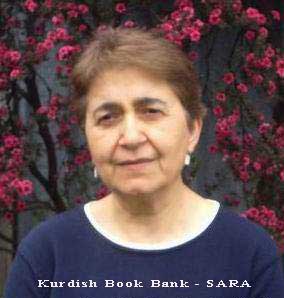 Nûra Cewarî is a kurdish author from the former Soviet Armenia, born in 1941 in the capital of Armenia - Yerevan. She is currently living in Melbourne in Australia.
Nûra Cewarî is a kurdish author from the former Soviet Armenia, born in 1941 in the capital of Armenia - Yerevan. She is currently living in Melbourne in Australia.Her mother worked at Radio Yerevan and after college, Nûra started to work in the Music highscool of Yerevan in 1960 and in 1967 she started as an aspirant in the Institute of Academic Artist of Armenia and from there, her career started.
Friday, August 31, 2007
Meryem, the Kurdish singing Armenian
Meyrem Xan was adopted during the genocide, Emin Ahmet Aga adopted her
he was from a big and rich family, the family noticed that Meyrem Xan
sang very sadly but still beautiful and also creating her own music,
she was also writing her own lyrics. They heard that her songs
was working on a problem, that she was going through a trauma.
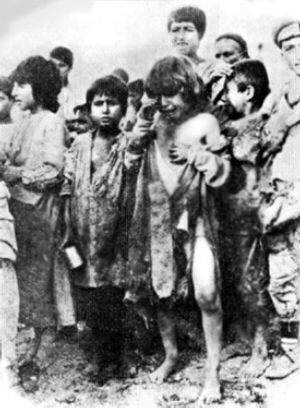 It was common that locals bought a christian orphan children from the Ottoman armies, it can be discussed if it is considered saving the life of a child or not.
It was common that locals bought a christian orphan children from the Ottoman armies, it can be discussed if it is considered saving the life of a child or not.Actually "adoption" during the genocide means that someone purchased
a christian child, she was born in the tumults in 1904 and lived
through the genocide as an child and youth.
Meyrem was only singing about the family and her new home, about the mountains,
about their village in Botan (Besîr) - Her singing style was a Besîrî style
When the LP technique was modern in all of middle east she went to Armenia and sang
in Denge Erivan and later on in Radio Baghdad where other famous Kurdish artists
had been like Nesrin Serwan, Ayse San and Gulbehar.
She was 45 when she passed away in 1949 in Baghdad, Iraq.










